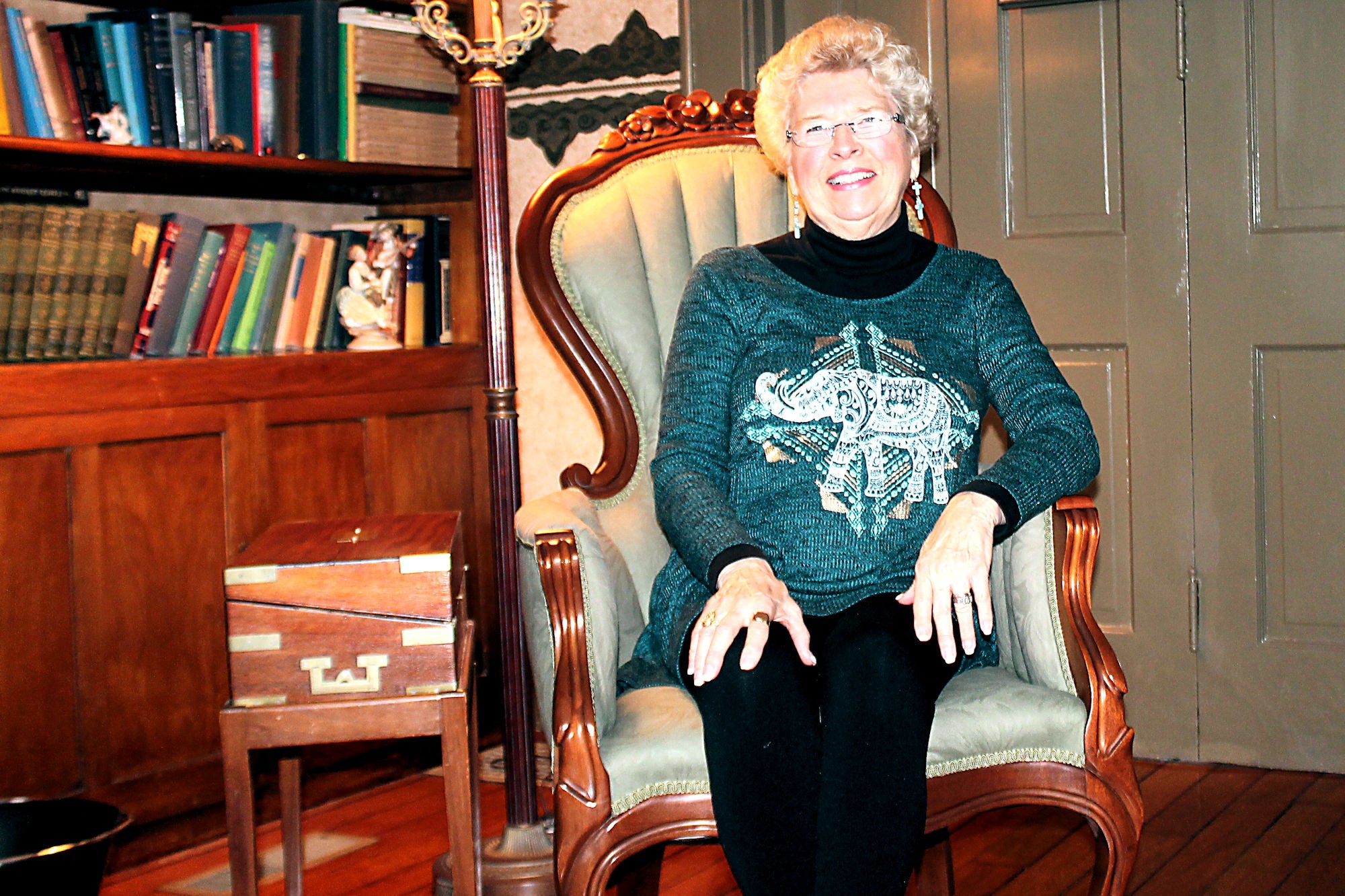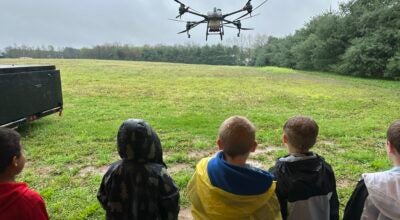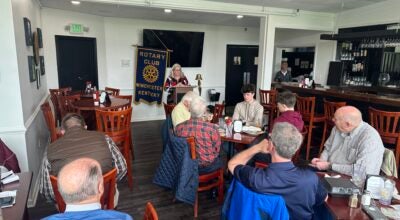Guerrants made life of healing, helping others
Published 12:35 pm Monday, March 20, 2017

- Lana Guerrant poses for a photo inside the Guerrant Mountain Mission Bed and Breakfast, located at 21 Valentine Court in downtown Winchester. (Photo by Whitney Leggett)
When the dart landed around Valentine Court in Winchester, Lana and Wallace Guerrant were taking in a quiet Saturday afternoon at the Guerrant Mountain Mission Bed and Breakfast, which they call home.
Tucked behind what is now the Bluegrass Heritage Museum on South Main Street in downtown Winchester, the bed and breakfast was once living quarters for the nurses and doctors who worked at the Guerrant Clinic.
Once a bustling hospital, the Guerrant Mountain Mission Clinic and Hospital was renowned as one of the four best small hospitals in the Southeastern U.S.
Wallace Guerrant’s father, grandfather and great-grandfather were evangelists and physicians, who healed and ministered to the people of Appalachia. Wallace himself went on to become an epidemiologist who spent many years studying the typhoid outbreak in eastern Kentucky.
In 1934, the nurses’ home behind the clinic was destroyed by fire. Two years later, it was rebuilt to accommodate five nurses and an apartment for Dr. and Mrs. Edward Putney Guerrant. The home also featured a common dining room, formal dining room, parlor, full finished basement and a kitchen for preparing patients’ meals.
Lana Guerrant said the home was built entirely by donations from wealthy people in Clark County who sought to support the Guerrants’ mission. Much of the labor was done by people from eastern Kentucky who had been treated or ministered to by the Guerrants.
“They had such love for the Guerrant family,” Lana said. “We wanted to preserve the home because it had so much history of the community. It was built with the love and labor of people who had been helped by the Guerrants physically or spiritually.”
When the clinic closed in the 1980s, the nurses’ home eventually fell into disrepair. In 1998, Lana and Wallace Guerrant, along with their sons, fully renovated the home.
The Federal style bed and breakfast building is one of four turn-of-the-century historical buildings still remaining on the grounds.
Today, Lana Guerrant no longer operates a full-fledged B&B. Rather, she opens her doors to ministers and missionaries visiting area churches.
At the surface, the most intriguing story to tell about the modern Guerrants involves the great work and impact of their ancestors. In fact, ministry and missionary work have extended over at least six generations of the Guerrant family. Today, many of Lana and Wallace’s children and grandchildren also make a living working as nurses, counselors, teachers and in various other service-oriented careers. Several of their grandchildren do mission work abroad regularly.
However, at the heart of Lana’s and Wallace’s story is one of compassion for migrant workers who came to America, legally and illegally. Eventually, this passion for ministering to migrant workers would lead to the completion of their family, Lana said.
The Guerrants have eight children — a biological son and daughter and six adopted children.
“We never adopted babies,” Lana said. “Our youngest was six when he came to us, but he was more like a toddler in many ways.”
When the Guerrants first began to consider adoption, they were empty nesters, Lana remembers.
“We went to a talk at a Kiwanis meeting,” she said. “The speaker was a woman from Holt (International Children’s Services) in Eugene, Oregon.”
After the discussion, Wallace Guerrant spent some time talking with the representative and came home with applications for adoption. Lana wasn’t prepared for more children, though.
“Our first two children were already through with school and we had our first grandchild already,” she said. “I wanted to throw the applications away, but instead I put them up in the attic hoping that Wallace would just forget about it.”
Wallace didn’t forget.
“He kept saying ‘God wants us to do this,’” she said. “So I got on board.”
In 1989, the Guerrants flew to Costa Rica to bond with a group of four siblings who had been difficult to place. In February 1990, they returned to bring the children, a girl and three boys, home with them.
“They were healthy physically, but they had some other problems associated with having lived in an institution,” Lana said. “But they had so much love for each other and for others.”
As Lana talks about her children, her smiles reveals the utter joy and pride she has a mother. She excitedly shows off photos of her children and their families as she boasts of their successes. With equal excitement, she tells of their kind and sweet personalities and of their wonderful spouses.
With tears in her eyes, Lana also tells the story of how she came to know and eventually adopt two more sons.
“They have a completely different story,” she said as she choked back tears. “It’s a story of immigration that I have wanted for so long to share.
“Our family has lived the illegal alien life and we made it work, because God was in it.”
The story of the sons who would eventually help Lana and Wallace renovate the bed and breakfast, starts with a shooting in Clark County. Lana recalls two Clark County farmers who were killed by three illegal immigrant boys in a dispute over money.
“There was bad on both sides of the story,” Lana said. “It was a terrible, terrible thing. And, from that, there was much resentment in Clark County against the Hispanic community.”
A local farm family, the Longs, would eventually call on Lana and Wallace to help overcome one of the barriers at the core of the issue.
“Brenda Long, the widow of Johnny Long, began telling everyone to calm down on the resentment to the Hispanics,” Lana said. “There was a terrible language barrier and many of the immigrants were scared. I had taught four Costa Rican children English in my home. So, Brenda asked me to come into her home and teach the men who worked on the farm English.”
At the first meeting, there were so many people the house was filled.
They decided to move the classes, which became a language exchange where people could learn English and Spanish, to First United Methodist Church.
“From there, the workers began asking if they could come to church there,” Lana said. “I told them of course they could. So, I bought a van and began picking them up for church.
“That’s how we met our darling (sons). They were illegal migrant workers who came to our program.”
The family of the fifth child the Guerrants adopted migrated here from Mexico, Lana said.
“(His) biological father had been murdered in Mexico,” she said. “He came here with his older brothers, but always held on to a promise his dad made him that he would be able to go to school in America.
“He was always passionate about going into the medical field because he said his dad died in the back of a pickup truck from a stab wound, and he wanted to be able to help people because of that experience.”
Lana said the boy, who was 15 at the time, desperately wanted to go to school, so when his family needed to migrate for work, he didn’t want to go. One of his brothers came to Lana and asked if he could stay with them and go to school.
“We didn’t have to think about it long,” she said. “And along with him, came another son shortly after.”
The Guerrant’s eighth child migrated to the U.S. from Guatemala when he was 12 years old.
“The Guatemalan and Mexican workers didn’t get along well,” Lana said. “So they lived in separate bunk houses and stayed relatively segregated. Erik lived in one of the rough bunkhouses out in Becknerville I said I wouldn’t visit.
“But a translator, Ricky, asked me if there was just one person there who wanted to go to church, would I visit.”
Lana said she would, and on that visit, she met a 15-year-old young man with crisp hair and neatly ironed clothes.
“I began speaking to him in my terrible Spanish and he proudly answered back ‘I speak English,’” she said.
Again, when this young man’s group decided to move on for work, he didn’t want to go.
“We offered to let him stay with us, but he didn’t jump at it at first like we thought he would,” Lana said. “But one day he came to us with his backpack full of stuff. He asked ‘Can I go to school like Julio?’”
Lana said both were great boys, but had difficulty growing up because of their illegal status. Without things as simple as a Social Security number, the boys faced hardships.
“In high school they just made up an ID number for them,” Lana said. “But they really wanted to go to college and they couldn’t do that without a social security number.”
Several area colleges wanted to accept them, but without the proper documentation, there was fear of lost financial aid.
“The dean of admissions at Transylvania (University) eventually called the dean of admissions at Lexington Community College [now Bluegrass Community and Technical College] and they said they would accept them both,” she said. “We were so excited they could go to college that we got all dressed up to go to their admissions meeting.
“It suddenly dawned on us that no one else was dressed like us, but we didn’t care. The boys had done what we thought was impossible. They were going to college.”
The first young man was eventually accepted to the University of Kentucky on promise he would work towards his citizenship. He graduated with a nursing degree and fulfilled his dream to work in the medical field with a job at UK hospital. He expects to gain his official citizenship in August.
The other went on to Eastern Kentucky University, where he got degrees in foreign language and international business. He earned his citizenship about six years ago.
“It was a beautiful ceremony to attend,” Lana said. “When he got his paperwork, the first thing he opened was his voter registration card. He was so thrilled to be able to vote.”
In today’s climate of discussion about immigration, Lana said her sons have given her a unique perspective on immigrants.
“I have a different concern for wanting to stop illegal immigration,” she said. “My concern is for the safety of those trying to cross the border.”
She said her work with the migrant community has also opened her eyes to how they contribute to the community.
“They have done a lot of great things for our community,” she said.
Two years ago, Lana retired from her job teaching English as a Second Language for Clark County Public Schools.
Today, Lana spends her days caring for her husband, who has Alzheimer’s, and continues to open the home her sons helped her renovate at 21 Valentine Court to others with a passion for ministry.
The family still gathers in the kitchen of the bed and breakfast for Sunday dinners, where they all recount their lives work dedicated to caring for and serving others, something they each surely gleaned from the examples of compassion for others set by their parents.
“This was never our home, it’s God’s home,” Lana said.






